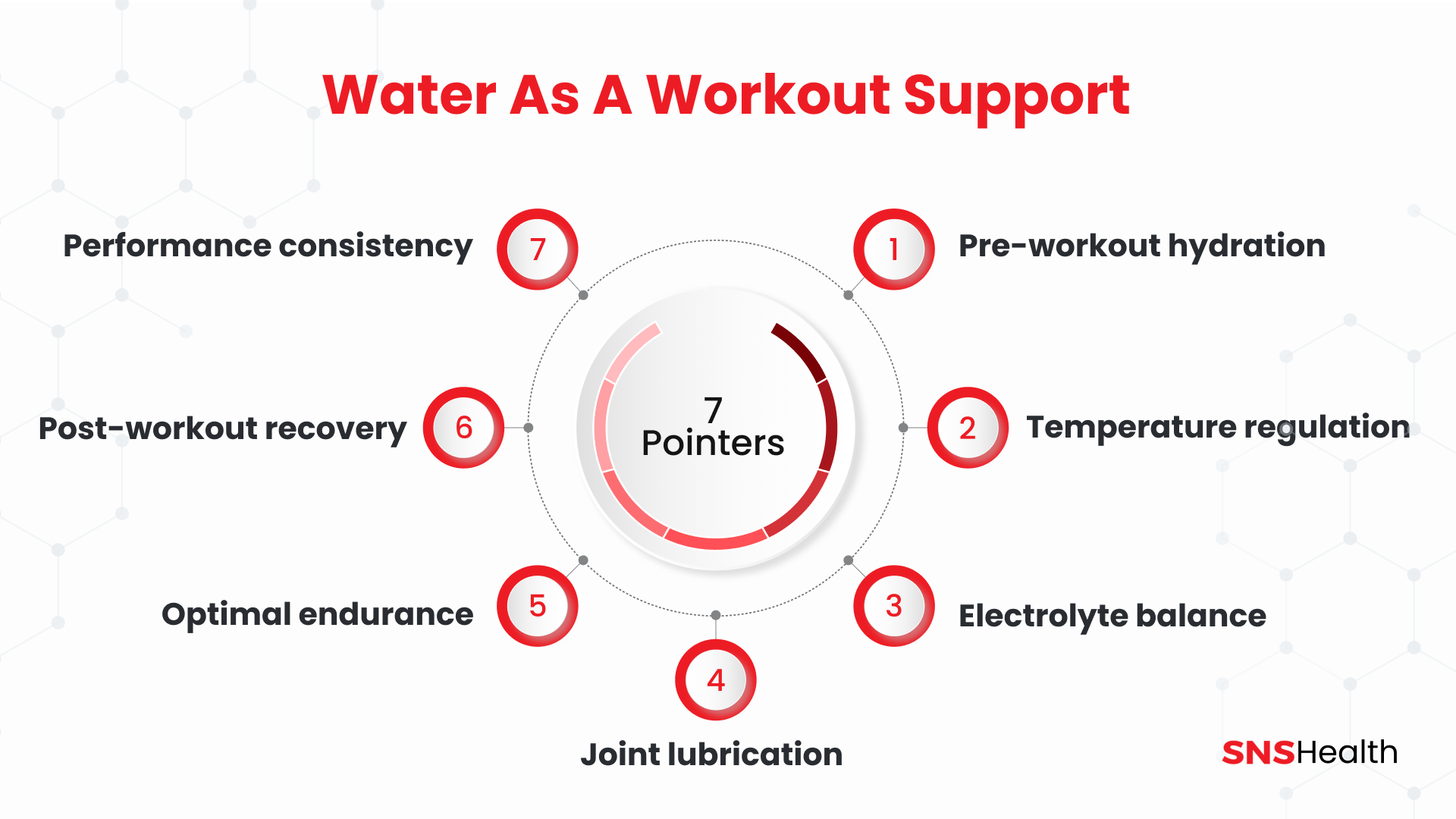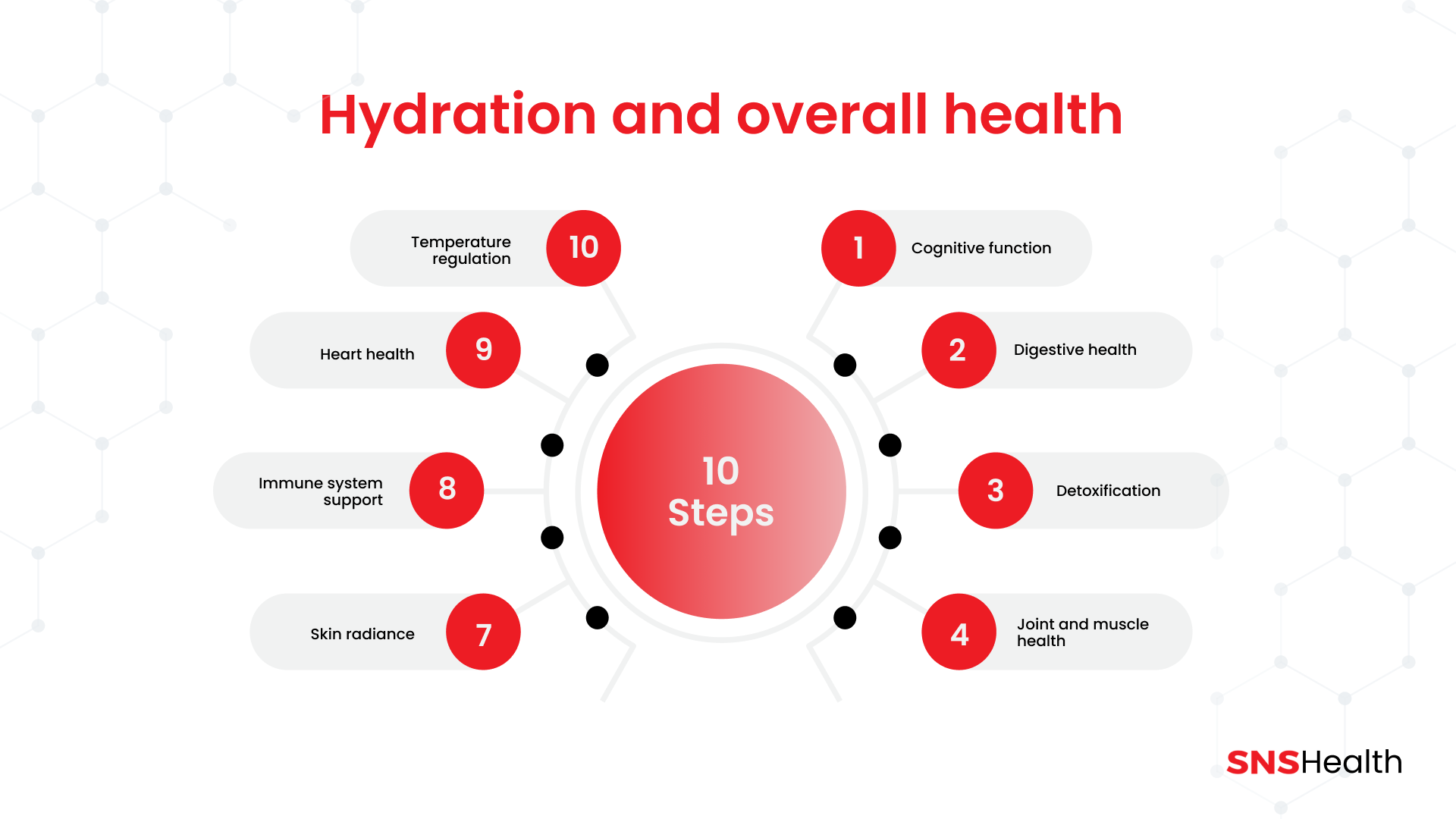Embarking on a journey toward weight loss requires more than dietary changes and workouts—hydration emerges as a silent hero. In the realm of health and wellness, water plays a multifaceted role, in influencing metabolism, appetite, and overall vitality. This exploration delves into the symbiotic relationship between hydration and weight loss, debunking myths, offering practical insights, and uncovering the transformative impact of staying well-hydrated. Beyond mere thirst-quenching, water becomes an essential element in the pursuit of a healthier, more balanced lifestyle. Join this expedition to unveil the often-overlooked power of hydration on the path to sustainable weight loss.
The role of water in weight loss
Proper hydration plays a pivotal role in achieving and sustaining weight loss. Understanding the connection between water intake and weight management is essential for those on a fitness journey. Here's a breakdown of the key aspects:
Metabolism boost: Drinking an ample amount of water stimulates metabolism, aiding the body in efficiently converting food into energy. This can contribute to an increased calorie burn throughout the day.
Calorie-burning elixir: Water itself is calorie-free, making it an ideal replacement for sugary drinks. By opting for water over high-calorie alternatives, individuals can create a calorie deficit, a fundamental aspect of weight loss.
Fat breakdown support: Adequate hydration supports the body's ability to break down stored fat. When well-hydrated, the liver can focus on metabolizing fat into usable energy, a process crucial for shedding excess pounds.
Hydration and appetite control
Understanding the intricate relationship between hydration and appetite is key to effective weight management. Here's a closer look at how staying adequately hydrated can positively impact appetite control:
Thirst vs. hunger: Dehydration often masks itself as hunger, leading individuals to consume unnecessary calories when all they really need is water. By staying hydrated, one can better differentiate between true hunger and the body's cry for fluids.
Appetite suppression: Drinking water before meals creates a feeling of fullness, naturally curbing appetite. This simple practice can contribute to reduced calorie intake during meals, supporting weight loss efforts.
Metabolic processes: Hydration is essential for the optimal functioning of metabolic processes. When the body is well-hydrated, it can efficiently metabolize nutrients, helping to regulate appetite hormones and prevent overeating.
Water as a workout support

Ensuring adequate hydration is a fundamental aspect of optimizing workout performance and achieving fitness goals. Here's an exploration of how water serves as a crucial ally in supporting exercise routines:
Pre-workout hydration: Consuming water before a workout is essential for preventing dehydration during physical activity. Proper hydration helps maintain energy levels, reducing the risk of premature fatigue.
Temperature regulation: Sweating is the body's natural cooling mechanism during exercise. Staying hydrated aids in efficient sweat production, promoting effective temperature regulation and preventing overheating.
Electrolyte balance: Intense workouts can lead to the loss of electrolytes through sweat. Replacing these electrolytes by drinking water helps maintain the body's balance, preventing muscle cramps and optimizing overall performance.
Joint lubrication: Water plays a role in lubricating joints. Hydration ensures that joints move smoothly, reducing the risk of injury during various exercises, especially those involving repetitive movements or impact.
Optimal endurance: Dehydration can significantly impact endurance levels. Proper fluid intake supports cardiovascular function, allowing the heart to pump blood more efficiently to working muscles, thereby enhancing endurance.
Post-workout recovery: Rehydrating post-exercise is crucial for recovery. Water aids in the transport of nutrients to muscles, facilitating the repair and rebuilding process, and helps flush out metabolic waste products.
Performance consistency: Consistent hydration contributes to more consistent performance over time. Staying well-hydrated ensures that the body is ready for each workout session, promoting sustained effort and progress toward fitness goals.
Optimal hydration for weight loss
Achieving weight loss isn't solely about diet and exercise; it also hinges on maintaining optimal hydration levels. Here's a comprehensive guide on how to stay adequately hydrated to support your weight loss journey:
Strategic water consumption: Adopt a proactive approach to water intake by drinking a glass before meals. This not only promotes a sense of fullness, reducing the likelihood of overeating, but it also kick-starts metabolism.
Consistent hydration throughout the day: Avoid sporadic water intake and aim for consistency. Sip water regularly to prevent dehydration, which can sometimes be mistaken for hunger, leading to unnecessary calorie consumption.
Water-rich foods: Incorporate water-rich foods into your diet, such as fruits and vegetables. These not only contribute to hydration but also provide essential nutrients and fiber, promoting overall well-being and satiety.
Hydration monitoring: Pay attention to your body's signals for thirst. Thirst is an indicator that your body requires fluids, and responding promptly helps maintain optimal bodily functions.
Replace sugary drinks: Cut down on sugary beverages and replace them with water. Not only does this reduce calorie intake, but it also eliminates the negative effects of added sugars on metabolism and weight gain.
Individual hydration needs: Recognize that individual hydration needs vary based on factors like body weight, activity level, and climate. Tailor your water intake to your specific requirements to ensure optimal hydration.
Hydration accountability: Keep track of your daily water intake. Using a water bottle with marked measurements can help monitor and meet your hydration goals consistently.
Challenges and solutions
Embarking on a journey to stay well-hydrated for weight loss can present its own set of challenges. Recognizing and addressing these hurdles is crucial for success:
Forgetfulness: The busy pace of life can lead to forgetfulness about regular water intake. Combat this by setting reminders on your phone or using water-tracking apps to stay on top of hydration goals.
Taste preferences: Some individuals find water bland and struggle to consume an adequate amount. Combat taste aversions by infusing water with fruits, and herbs, or opting for flavored water with no added sugars.
Limited access to water: Lack of access to water throughout the day can hinder hydration efforts. Carry a reusable water bottle wherever you go to ensure a constant supply and be mindful of opportunities to refill.
Busy lifestyle: A hectic schedule may lead to neglecting hydration needs. Make a conscious effort to integrate water breaks into your routine, especially during work hours, to maintain consistent hydration.
Sedentary habits: People with sedentary jobs may not feel the same level of thirst as those engaged in physical activities. Establish a routine of regular water breaks, irrespective of physical activity levels, to prevent dehydration.
Overreliance on other beverages: Dependency on caffeinated or sugary beverages can impede hydration efforts. Gradually replace these with water to break the habit and reduce unnecessary calorie intake.
Hydration and overall health

Beyond its role in weight loss, adequate hydration is a cornerstone of overall health, influencing various bodily functions and well-being. Here's an exploration of the broader health benefits associated with maintaining proper hydration:
Cognitive function: Hydration is essential for optimal brain function. Dehydration can lead to difficulties in concentration, memory lapses, and decreased cognitive performance. Regular water intake supports mental clarity and sharpness.
Digestive health: Water is a vital component of the digestive process. It aids in the breakdown of food, nutrient absorption, and the prevention of constipation. Staying well-hydrated promotes a healthy digestive system.
Detoxification: Water plays a crucial role in flushing out toxins and waste products from the body. A well-hydrated system supports the kidneys in effectively filtering and excreting waste, contributing to overall detoxification.
Joint and muscle health: Proper hydration helps maintain joint lubrication and reduces friction between bones. It also facilitates nutrient transport to muscles, supporting their function and minimizing the risk of cramps and injuries.
Skin radiance: Dehydration can lead to dry, dull skin. Optimal hydration promotes skin elasticity, preventing premature aging and enhancing a radiant complexion.
Temperature regulation: Water is a primary component of the body's thermoregulation system. Proper hydration ensures that the body can effectively cool itself through sweating, preventing overheating during physical activity or in hot environments.
Heart health: Adequate hydration supports cardiovascular health by maintaining blood volume and viscosity. This, in turn, contributes to healthy blood pressure levels and reduces the risk of cardiovascular issues.
Immune system support: Hydration is vital for the proper functioning of the immune system. It helps transport immune cells and antibodies throughout the body, enhancing the body's ability to fight off infections.
Myths and facts about hydration and weight Loss
Myth: Drinking water alone leads to weight loss.
Fact: While hydration is crucial, it's not a magic solution. Drinking water can support weight loss by promoting a feeling of fullness and boosting metabolism, but it works best when combined with a balanced diet and exercise.
Myth: More water means faster weight loss.
Fact: Overhydration doesn't equate to accelerated weight loss. The key is meeting individual hydration needs. Drinking excessive water won't magically shed pounds; it might even lead to electrolyte imbalances.
Myth: Thirst is always a sign of dehydration.
Fact: Thirst is a reliable indicator, but it doesn't always mean you're dehydrated. Listen to your body, but don't panic if you occasionally feel thirsty without being underhydrated.
Relatable Read:
Hydration for athletes: how sports hydration drinks enhance performance
High-Protein Diet Benefits and Top Supplements for Unleashing Weight Loss
SNS Health - Your #1 source for hydration supplements
SNS Health - your go-to source for optimal hydration! Elevate your wellness with our premier selection of hydration supplements. Top hydration supplements from brands like Prime, O2 Hydration, Liquid IV, Vega, Biosteel, Hydralyte, Vita Coco, and many more are available only at SNS Health at affordable prices.
Conclusion
In the quest for weight loss, hydration emerges as a potent, often underestimated ally. Beyond shedding pounds, water influences cognitive function, digestive health, and overall well-being. By dispelling myths and embracing the facts, one can harness the transformative power of hydration for a healthier, more vibrant life.








